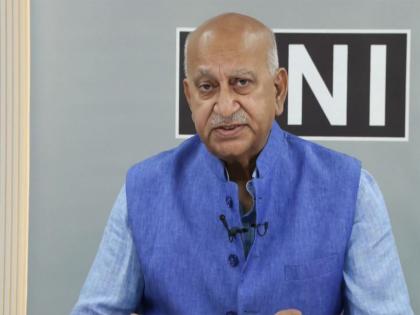"This is starting point of Pakistan's destruction": MJ Akbar on strikes in Afghanistan
By ANI | Updated: October 11, 2025 00:00 IST2025-10-10T23:56:33+5:302025-10-11T00:00:05+5:30
New Delhi [India], October 10 : Former Minister of State for External Affairs MJ Akbar has said that ...

"This is starting point of Pakistan's destruction": MJ Akbar on strikes in Afghanistan
New Delhi [India], October 10 : Former Minister of State for External Affairs MJ Akbar has said that Pakistan's reported attack on Afghanistan could trigger the beginning of its internal collapse, calling it "the starting point of the destruction of Pakistan."
Speaking toon Friday, Akbar said, "Let me touch upon the most important consequence of this attack (Pakistan's attack on Afghanistan). This is the starting point of the destruction of Pakistan, the split of Pakistan into various countries. Already, the tensions have been very obvious... The Khyber Pakhtunkhwa region has been struggling for independence. Right from Abdul Ghaffar Khan's time, it has taken a fresh momentum. The war for independence in Balochistan has been well recorded; it has been continuing."
Akbar linked Pakistan's instability to its handling of internal dissent and external partnerships, adding, "That is one of the reasons the rare earths that China has now put on to play, and which Pakistan is trying to fool America with. We must ask ourselves a question: why did China never mine those rare earths? Because the situation is too fraught with danger."
Referring to Pakistan's foreign policy and its ties with major powers, he remarked, "Pakistan is taking a weird confidence in a brief lunch with President Trump and is puffing its wings. The first relationship with Pakistan was established in 1949-50 by the 33rd President, Harry Truman, who welcomed Prime Minister Liaquat Khan to Washington, and he sent a plane to London to bring him there. But Pakistan should also remember a very famous saying by Harry Truman that if you want a friend in Washington, you should get a pet dog."
Commenting on the growing tension between Kabul and Islamabad, Akbar said, "The flare-up (between Afghanistan and Pakistan) exposes Pakistan as a ringmaster of lies, working its policies on a strategy of illusions. Pakistan has just positioned itself self-dramatically, as a kind of maestro of an Eastern NATO. An Eastern NATO, which would be an Eastern Islamic NATO. It's an illusion that it has sold in order to find ways to cover up its bankruptcy or to maintain liquidity at a time when it has gone bankrupt."
He further said, "Pakistan has absolutely no morality, and this attack by Pakistan will be protected and justified by the same number of lies that Pakistan used during its provocative attack on India, which was successfully repelled. The same bizarre concoction of lies will be used, but this time, Pakistan has nowhere to hide. Afghanistan's foreign minister is here. That was probably instrumental in choosing this particular moment. Pakistan wanted to send a signal, but if it wanted to send a signal, then it has backfired very badly."
A series of explosions and bursts of gunfire rattled Afghanistan's capital late Thursday evening, prompting social media speculation that Pakistan was behind the attack, Al Jazeera reported.
Akbar has pointed to mounting crises in Pakistan, citing Beijing's decision to halt funding for a major railway project as a key economic challenge, while highlighting that Gen Z protests in the country are seeking broader systemic change.
Akbar told ANI, "The tap from China is now being shut. That is one of the great crises for Pakistan that China has now refused to fund the railway project, which is about 6-7 billion dollars, because they are seeing corruption and wastage of the money. They are seeing no hope of the money coming back, and China is careful."
The project in question is the Main Line-1 (ML-1) railway, part of the China-Pakistan Economic Corridor (CPEC), originally meant to modernise the country's railway network. With Beijing stepping back after years of stalled negotiations, Pakistan is reportedly seeking a USD 2 billion loan from the Asian Development Bank to upgrade the Karachi-Rohri section of the line, signalling a significant realignment in its infrastructure financing strategy.
Akbar also commented on the rising political unrest in Pakistan, particularly among the younger generation. "The one significant difference between the upsurge in Sri Lanka, Bangladesh, the Philippines and Nepal; in all these countries, the Gen Z rose to get regime change. In Pakistan, they are rising to get the country changed," he said.
Disclaimer: This post has been auto-published from an agency feed without any modifications to the text and has not been reviewed by an editor
Open in app